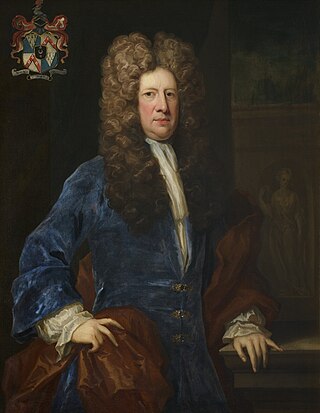Related Research Articles

Sir Joseph Williamson, PRS was an English civil servant, diplomat and politician who sat in the House of Commons of England variously between 1665 and 1701 and in the Irish House of Commons between 1692 and 1699. He was Secretary of State for the Northern Department from 1674 to 1679.

Vice-Admiral Thomas Butler, 6th Earl of Ossory, KG, PC, PC (Ire) was an Irish soldier and politician. He was the eldest son of James Butler, 1st Duke of Ormond but predeceased his father and therefore never succeeded as duke.

Sir Cyril Wyche FRS was an English lawyer, politician and administrator. He served two terms in the Dublin Castle administration as Chief Secretary for Ireland and was a Lord Justice of Ireland from 1693 to 1695. He was the fifth President of the Royal Society, and represented several constituencies in both the House of Commons of England and the Irish House of Commons.

Sir Orlando Bridgeman, 1st Baronet, was an English common law jurist, lawyer, and politician who sat in the House of Commons from 1640 to 1642. He supported the Royalist cause in the Civil War.

William Russell, 1st Duke of Bedford KG PC was an English nobleman and politician who sat in the House of Commons from 1640 until 1641 when he inherited his Peerage as 5th Earl of Bedford and removed to the House of Lords. He fought in the Parliamentarian army and later defected to the Royalists during the English Civil War.

William Pierrepont was an English politician who sat in the House of Commons at various times between 1640 and 1660. He supported the Parliamentary cause in the English Civil War.

Henry Cavendish, 2nd Duke of Newcastle upon Tyne, KG, PC, styled Lord Henry Cavendish until 1659 and Viscount Mansfield from 1659 to 1676, was an English politician. He sat in the House of Commons from 1660 until 1676, when he inherited the dukedom.
Sir John Ernle was an English politician who sat in the House of Commons at various times between 1654 and 1695. He was one of the longest-serving Chancellors of the Exchequer, a position he held from 2 May 1676 to 9 April 1689.
Thomas Willoughby, 1st Baron Middleton, was a Tory politician who sat in the English and British House of Commons between 1698 and 1711 when he was raised to the peerage as Baron Middleton as one of Harley's Dozen.

Sir Edward Blackett, 2nd Baronet was an English landowner and politician who sat in the House of Commons at various times between 1689 and 1701.
Roger Whitley was a royalist officer in the English Civil War, attaining the rank of Major General and was closely involved throughout the 1650s in plans for a royalist uprising against the Interregnum and Protectorate regimes. He had accompanied the young King Charles II into exile and carried the kings orders into Cheshire on the rising of forces, under Lord Delamere, at the eve of the Restoration.

Sir Peter Leycester, 1st Baronet was an English antiquarian and historian. He was involved in the English Civil War on the royalist side and was subsequently made a baronet. He later compiled one of the earliest histories of the county of Cheshire and as a result of this became involved in a controversy with the Mainwaring family. He developed a library in his home at Tabley Old Hall and made improvements to the house and estate, including building a private chapel in the grounds of the house. He was an active and conscientious justice of the peace and used his position on the Bench to expound his staunchly conservative and Royalist political views.
Sir Daniel Harvey was an English merchant and diplomat who was the English Ambassador to the Ottoman Empire from 1668 to 1672.

Augustine Skinner was an English politician who sat in the House of Commons variously between 1642 and 1659. He took the Parliamentary side during the English Civil War.

Sir John Cutler, 1st Baronet (1603–1693) was an English grocer, financier and Member of Parliament.

Sir Frescheville Holles was an English Royal Navy officer and politician who sat in the House of Commons from 1666 to 1672. He was killed in action fighting in the Anglo-Dutch war.

Sir Humphrey Forster, 2nd Baronet was an English politician who sat in the House of Commons at various times between 1677 and 1695.
William Cooke, of Highnam Court, Gloucestershire, was an English politician. He was a Member (MP) of the Parliament of England for Gloucester in 1679 and 1689 to 1695.
Townshend Mainwaring was a British Conservative Party politician.
Sir Thomas Earle, of Bristol and Crudwell, was an English merchant and politician who sat in the House of Commons from 1681 to 1685.
References
- 1 2 3 4 Henning, Basil Duke, ed. (1983). The House of Commons, 1660-1690. Boydell & Brewer. pp. 3–4. ISBN 978-0-43619-274-6.